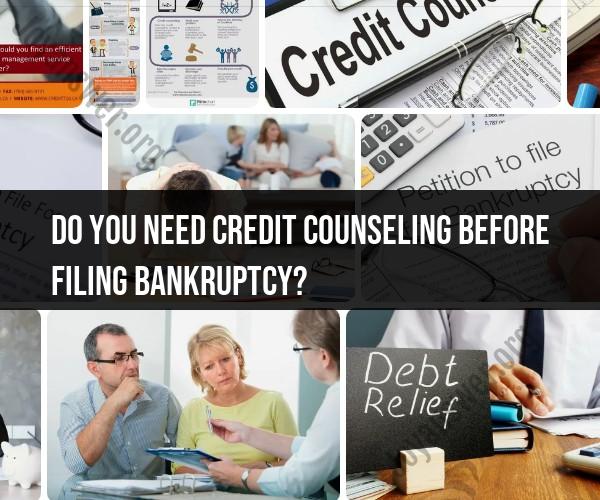Do you need credit counseling before filing bankruptcy?
Yes, you typically need to complete credit counseling before filing for bankruptcy in the United States. Credit counseling is a mandatory step in the bankruptcy process, and it's designed to provide individuals with financial education and explore potential alternatives to bankruptcy. Here's what you need to know about credit counseling before filing for bankruptcy:
1. Pre-Filing Credit Counseling:
- Before you can file for bankruptcy, you must complete a credit counseling course from a government-approved credit counseling agency. This course is often referred to as "pre-filing credit counseling" or "pre-bankruptcy counseling."
2. Purpose of Credit Counseling:
- The primary purpose of pre-filing credit counseling is to help you assess your financial situation, explore possible alternatives to bankruptcy, and ensure that you have considered all available options. It aims to provide you with the information you need to make an informed decision about bankruptcy.
3. Approved Credit Counseling Agencies:
- You must complete the credit counseling course through an agency approved by the U.S. Trustee Program, which is part of the Department of Justice. The U.S. Trustee Program maintains a list of approved agencies on its website.
4. Course Content:
- The credit counseling course typically covers various financial topics, including budgeting, credit management, debt repayment strategies, and the implications of bankruptcy. It is usually offered in person, online, or by phone.
5. Certificate of Completion:
- After completing the course, you will receive a certificate of completion. You must include this certificate when you file your bankruptcy petition. Without it, your bankruptcy case may be dismissed.
6. Timing of Filing:
- You can file your bankruptcy petition after completing the credit counseling course. Be sure to file within 180 days (approximately six months) of completing the course, as the certificate has an expiration date.
7. Exceptions and Extensions:
- In some cases, individuals may qualify for an exemption from the credit counseling requirement or an extension of the deadline to complete the course. For example, if you face urgent circumstances, such as impending foreclosure, you may be granted an extension.
8. Post-Bankruptcy Debtor Education:
- After you file for bankruptcy, you are also required to complete a second financial education course known as "debtor education" or "post-bankruptcy counseling." This course focuses on financial management and budgeting skills and is intended to help you make sound financial decisions after bankruptcy.
9. Compliance with Legal Requirements:
- Compliance with the credit counseling requirement is a fundamental part of the bankruptcy process. It ensures that individuals have access to financial education and resources before proceeding with bankruptcy.
Failure to complete the required credit counseling and debtor education courses can result in the dismissal of your bankruptcy case. Therefore, it's essential to work with a bankruptcy attorney or advisor who can guide you through the process and help you meet all legal obligations when considering bankruptcy as an option for managing your financial difficulties.
Bankruptcy and Credit Counseling: The Essentials You Must Understand
Bankruptcy is a legal process that allows individuals and businesses to discharge their debts. Credit counseling is a confidential process that helps people understand their finances, develop a budget, and create a plan for managing their debt.
Preparing for Bankruptcy: The Role of Credit Counseling
Credit counseling can be a valuable resource for people who are considering bankruptcy. Credit counselors can help you to:
- Understand your financial situation
- Identify and address the causes of your debt problems
- Develop a budget and debt management plan
- Explore all of your debt relief options, including bankruptcy
Credit counseling is also a legal requirement for all bankruptcy filers. Before you can file for bankruptcy, you must complete a credit counseling session with a certified credit counselor from an approved agency. You can find a list of approved credit counseling agencies on the website of the United States Trustee Program.
Legal Requirements: Credit Counseling Before Filing for Bankruptcy
The credit counseling session must cover the following topics:
- The causes of your financial problems
- Budgeting
- Credit management
- Debt repayment options
- Bankruptcy
Once you have completed the credit counseling session, you will receive a certificate of completion. You must file this certificate with the bankruptcy court before your bankruptcy case can be filed.
The Benefits of Credit Counseling
Credit counseling can be a valuable resource for anyone who is struggling with debt or who is considering bankruptcy. Credit counselors can help you to:
- Understand your finances
- Develop a plan for managing your debt
- Avoid bankruptcy if possible
- Improve your credit score
- Achieve your financial goals
If you are considering bankruptcy, I encourage you to contact a credit counselor for help. Credit counselors can help you to understand your options and make the best decision for your financial situation.












